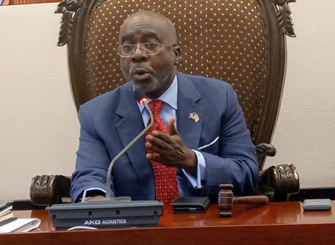The recent revelation regarding the alleged attempt to remove Speaker J. Fonati Koffa from his position in the House of Representatives has stirred significant controversy and condemnation. A group of 48 lawmakers reportedly accepted US$15,000 each, amounting to a staggering US$720,000, to support a coup against the Speaker. This disgraceful situation has raised serious ethical concerns about the motivations behind the removal initiative. Critics, including former presidential candidate Cllr. Tiawan S. Gongloe, have pointed out that such actions stem from selfish interests rather than any genuine desire to improve the welfare of the Liberian people. The underlying motivations appear to be driven by personal gain rather than the need to bolster governmental integrity or deliver essential public services.
The urgency of the situation became particularly palpable when the news broke on October 17, with many Liberians feeling a collective shudder at the political machinations unfolding in their legislature. Cllr. Gongloe has labeled the maneuver as a “criminal conspiracy,” further emphasizing the lack of probable cause that should accompany any legitimate attempt to remove a government official. The timing of this coup—while Speaker Koffa was abroad—raises questions about the integrity of the lawmakers involved. Instead of acting in the best interest of their constituents, it seems that personal and financial incentives have overridden any sense of civic responsibility or duty to the nation.
In light of these developments, the actions of these lawmakers are increasingly characterized as not only unethical but also as a troubling reflection of the state of governance in Liberia. The willingness of representatives to trade their integrity for money signals a profound disrespect for the positions they hold and the citizens they represent. Public trust is paramount in a democratic society; however, such behavior serves only to erode that trust, putting into question whether these lawmakers serve the interests of their constituents or their own financial desires. This ethical breach represents a betrayal of the very essence of democratic governance, where elected officials are expected to prioritize the common good over personal enrichment.
Furthermore, the potential consequences of these actions extend beyond the immediate political landscape. By engaging in behaviors that could classify as a “paid-to-play” scheme, these lawmakers not only undermine the legislative process but also stigmatize Liberia on an international level. Development partners and foreign observers may conclude that Liberia is not ready for serious negotiations pertaining to governance or development assistance when its leaders resort to corrupt practices to achieve personal or political aims. This perception could have wide-reaching consequences for the resources and support that Liberia requires to foster economic growth and stability.
In a nation where the sanctity of public office should be protected, this situation presents a call to action for lawmakers to reflect on their roles as custodians of public trust. They must strive to fulfill their responsibilities with integrity and dedication to the welfare of the populace rather than becoming entangled in corrupt schemes that pay little regard to the principles of democracy. By focusing on legislation that genuinely improves the standard of living for Liberians, lawmakers can begin to restore faith in the legislature and demonstrate their commitment to the public interest.
In conclusion, the unfolding saga surrounding the attempted removal of Speaker J. Fonati Koffa underscores a broader issue of governance and ethics in Liberia. As the nation grapples with the implications of this scandal, there is an urgent need for lawmakers to reclaim their dignity and prioritize legal and ethical responsibilities over self-serving motives. Only through such a commitment can Liberia hope to progress and emerge as a credible entity on the global stage, reflective of a government that truly advances the interests of its people.


